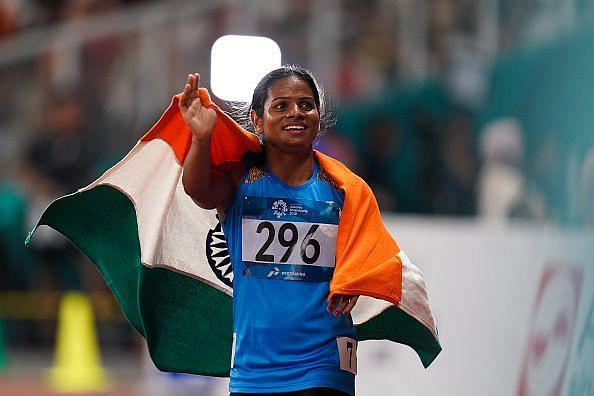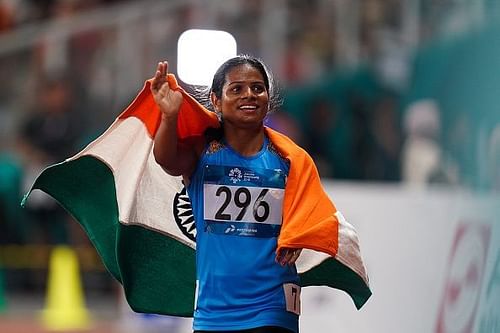
From Hockey powerhouse in Olympics to formidable force at Asian Games, Indian sports has certainly come of age

The 2018 Asian Games shall come to a grand closure on September 2 with a glittering closing ceremony at Jakarta. After two weeks of intense competition which saw athletes from 45 nations competing across 40 disciplines, India ended the games with their best ever medal haul. It indeed is a proud moment for any Indian as the nation finished its campaign with its best-ever medal tally of 69 at the continent’s grandest multi-sporting extravaganza.
The sub-continent powerhouse India improved on its performance from the last Asiads held in Incheon, South Korea where the country had bagged 57 medals. India also its improved gold medal count winning 15 yellow medals as compared to the 11 it had won at the 2014 Games.
The highlights of India’s stellar Asian Games campaign was the stupendous showing in the track and field events in athletics. It was heartening to see India win medals in sports like table tennis, squash, wushu and bridge which are not considered its traditional strength. India fared reasonably well in its strong events like shooting, wrestling and tennis, however, there were some major disappointments in women’s boxing, weightlifting and archery.
It is credible that some of the swimmers and divers made it to the finals of their respective events. There certainly were unexpected upsets in hockey and kabaddi but they shall serve as a reality check at major events in the future.
Indians have been proud of their great legacy in hockey. Our grandfathers and fathers often narrated inspirational stories about the golden generation of Indian hockey who were undoubtedly the undisputed kings of the sport. The heroics of the legendary Dhyan Chand with his mesmerizing dribbling skills have become stories of folklore.
Six straight Olympic golds followed by one silver and two bronze from 1928 to 1972 was a stupendous feat by our hockey wizards which would take a long time to beat. However, I often pondered as to why we weren’t more successful across other sporting disciplines. One had to really dig dip and search hard to finally get the names of Norman Pritchard and Khashaba Jadhav who were the only two Indian individuals to win medals at Olympics.
While Pritchard won two silvers at the 200m and 200m hurdles in the 1900 Olympics, Jadhav won a bronze in wrestling at the 1952 games at Helsinki.
In seven decades after gaining independence in 1947, our sporting accolades have been far and few. We certainly needed some real success stories and role models who could be emulated by future generations. Although we produced world champions like Wilson Jones, Michael Ferrera, Vishwanathan Anand, Geet Sethi and Pankaj Advani, unfortunately, neither chess nor cue sports was a part of the Olympic sports program. The same applied to Kabbadi where India have been the dominant powerhouse of the sport winning a record eight World Cup titles.
Indian football had its heyday in the 50s and 60s with the national team winning Gold at the 1951 Asian Games title besides finishing second at the AFC Asian Cup. India’s win over the mighty West Indies in the 1983 World Cup victory changed the landscape of Indian sports forever.
Cricket became the sporting obsession of the country and hockey certainly lost its sheen. While cricket grew from strength as India went onto produce some stalwarts in Sunil Gavaskar, Kapil Dev, Sachin Tendulkar Anil Kumble, MS Dhoni and Virat Kohli to name a few, the hockey team saw its last major achievement with its maiden World Cup win in 1975. The 2007 T20 World Cup, 2011 World Cup, 2013 Champions Trophy and India becoming the number one side both in Tests and One Day Internationals certainly cemented cricket as the most loved and widely followed sport across the length and breadth of our country.
However, the achievements of Indians at the Asian level were equally noteworthy. The likes of Milkha Singh, PT Usha, Gurbhachan Singh Randhawa, Sriram Singh, Shiny Wilson, Bahadur Prasad, Shakti Singh, Anil Kumar to name a few were world-class, however, fell short at the Olympics. PT Usha, the ‘Queen of Indian athletics’ came the closest to winning a medal at the 1984 Olympics when she missed the bronze by four-hundredths of a second. Milkha Singh missed the 400m bronze by one hundredth of a second at the 1960 Rome Olympics. Anju Bobby George’s bronze in the long jump at the 2003 World Championships gave a big fillip to Indian athletics at the highest level.
We as Indians are certainly proud of Ramanathan Krishnan, Ramesh Krishnan and the Amritraj brothers' impressive runs at the Grand Slams. However, our rare moment of glory as a nation came when they lifted the Davis Cup title in 1966 and 1974. The Paes-Bhupathi doubles team won many laurels for the country both at the Asiads and David Cup.
Post their regrettable breakup, Paes and Bhupathi continued winning multiple grand slam titles on the ATP tour. Sania Mirza became the poster girl of Indian tennis and put Indian women’s tennis on the world map. Mirza’s highly successful doubles pair with Martina Hingis catapulted her to number one ranking on the WTA tour. In recent years, Somdev Devvarman, Rohan Bopanna, Yuki Bhambri, Ankita Raina and Ramkumar Ramanathan have spearheaded India’s challenge at the world level.
Indian badminton witnessed glorious heights when Prakash Padukone and Pullela Gopichand won the prestigious All England Badminton Championships. It was, however, Saina Nehwal’s consistent wins at the Superseries events on the World tour that changed the fortunes of Indian badminton forever. Soon after, P Kashyap, Kidambi Srikanth, HS Prannoy, Sai Praneeth and Sourav Verma followed her footsteps and made our male shuttlers a force to reckon with. PV Sindhu has emerged as a giant killer and her two silvers at the World Championships and 2016 Rio Olympics are a testament to her pedigree.
The 2010 Commonwealth Games turned out to be India’s most successful campaign at a multi-sport world event. Hosting the event, India finished third on the medals tally winning a staggering 101 medals. Boxing and wrestling were the highlights of India’s medal surging campaign. Eminent boxers like Vijender Kumar, Akhil Kumar, Manoj Kumar and Diwakar Prasad went on to reach lofty heights in their careers. Grapplers like Sushil Kumar, Yogeshwar Dutt and Narsingh Yadav brought India laurels at Asian and World championships.
In the mid and late 90s, Indian shooting came of age as ace shooters Jaspal Rana, Samresh Jung, Manavjit Singh Sandhu, Anjali Bhagwat, Mansher Singh consistently medalled at the Asian and World Shooting Championships. The likes of Gagan Narang, Jitu Rai, Heena Sidhu, Apoorvi Chandela, Rahi Sarnobat and Manu Baker have carried on the great legacy of Indian shooting.
Some other notable sportspersons who won titles at international events are Chetan Baboor, S Raman, Mouma Das, Poulomi Ghatak (table tennis) Jeev Milkha Singh, Jyoti Randhawa, Arjun Atwal, Anirban Lahiri (Golf), Sourav Ghosal, Ritwik Bhattacharya, Dipika Pallikal, Joshna Chinappa in squash.
Post winning the gold in hockey at the 1980 Olympics, India suffered a medal drought at three successive Olympics till Leander Paes brought home a bronze in tennis from the 1996 Olympics. The nation breathed a huge sigh of relief when weightlifter Karnam Malleshwari won the nation’s lone bronze in the 2000 Olympics. India who had always been a shooting powerhouse at the Asian Games witnessed a golden moment when Colonel (then Major) Rajyawardhan Rathore (Retd) won the first-ever individual silver at the Double Trap event in 2004 Athens Olympics.
Abhinav Bindra scripted history when he won Gold in the 10m Air Rifle event at the 2008 Beijing Olympics. Meanwhile, Vijender Singh and Sushil Kumar added two bronze medals in boxing and wrestling respectively. Indian sports was slowly but surely witnessing a renaissance of sorts.
India doubled its medal count at the 2012 London Olympics, winning six medals in all. Shooters Gagan Narang and Vijay Kumar clinched silver and bronze in shooting. Meanwhile, Saina Nehwal won India’s first ever bronze in badminton at the Olympics. MC Marykom became the first Indian female boxer to clinch a bronze in boxing. Wrestler Sushil Kumar became India’s most decorated Olympian adding a silver to his kitty. Meanwhile, wrestler Yogeshwar Dutt clinched a bronze.
The 2016 Olympics at Rio was disappointing for sure as India could only manage to win two medals. While PV Sindhu clinched the first ever badminton silver in women's singles, Sakshi Malik won a bronze in wrestling. There were some close misses as gymnast Dipa Karmakar finished a creditable fourth in the vault event and seasoned Olympian Abhinav Bindra lost the bronze by a whisker in the 10 m Air Rifle event.
With every passing edition of the Asian and Commonwealth Games, India has improved upon its medal tally which reflects an overall improvement in the standards of Indians across sporting disciplines. While India has been a force to reckon with in boxing, shooting, wrestling, kabbadi and archery; sports like badminton, table tennis, wushu are certainly on the upswing.
India’s medal surge at Jakarta has been a story of untiring toil and hard work put in by our sportspersons and a tremendous support mechanism provided by the many unsung heroes behind the scene. The government’s initiative like the ‘Khelo India’ and ‘Catch them young’ shall bring about a strong sports culture at the grassroots level.
World Class academies opened by former champions like Pullela Gopichand and PT Usha have paid rich dividends. The advent of professional leagues like Indian Badminton League, Ultimate Table Tennis League and Kabaddi League have raised the standards of Indian athletes. The Indian defence forces have played their part by producing a string of shooters, rowers and cross-country runners through the Mission Olympic Wing, Army Marksman Unit and rowing nodes.
Indian sports only stands to gain with its commendable performance at the 2018 Asian Games. Our richest medal tally shall serve as a morale booster for athletes to scale loftier heights. The 2020 Olympics at Japan is India’s next big mission and our athletes shall leave no stone turned to improve upon their performances. In all honesty, we are still a couple of notches behind Asian powerhouses like China, Japan and South Korea across sporting disciplines.
For India to be considered a real sporting nation, the government along with the corporate sector shall have to put in sustained efforts in uplifting the training standards, infrastructure and provide our athletes with high-performance coaches. India certainly has the raw talent to match the best on the world stage, all it needs is to be fine-tuned and nurtured in the right direction to produce world-class champions.